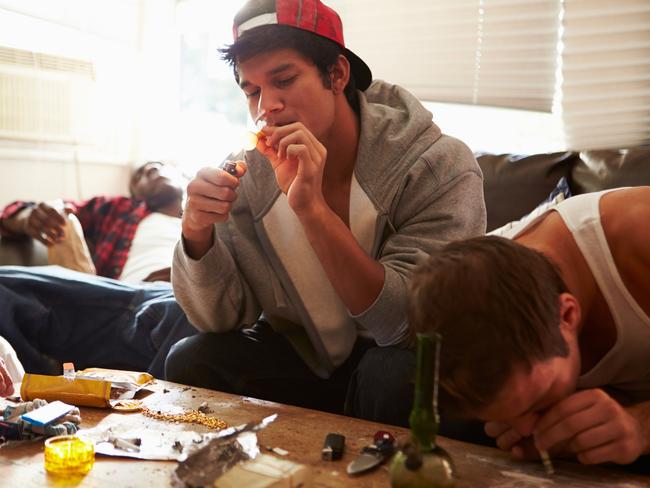Light sentences for meth-heads leave us with a heavy burden | David Penberthy
In many cases this cheap and readily available drug goes hand-in-hand with the constant provision of government money, writes David Penberthy.
Opinion
Don't miss out on the headlines from Opinion. Followed categories will be added to My News.
One of the genuinely weird things about the continuing surge in methamphetamine consumption is how a product with such hugely negative marketing can prove itself so popular.
There is not a person in the world who doesn’t know how badly this stuff can screw you up in record time. Yet its popularity has never been higher.
The reverse is true of other drugs, chiefly alcohol and tobacco, which have plummeted as a result of advertising campaigns, education, tax hikes, and changing social mores. The idea of rocking up at a social get-together with a packet of Craven A’s, one hanging lit from your lip, and a pewter tankard on a chain around your neck engraved with the word “Davo” has been consigned to the Don’s Party era.
People drink less in Australia now than at any time in our history, a fact with which the health lobby should grapple when it hatches its latest plot to besmirch our excellent local wine and spirits industry with grotesque warning stickers and higher taxes on quality drinks which are overwhelmingly consumed in moderation.
Not so with meth, the drug of the hour.

It’s interesting to compare meth to cannabis. The time-honoured parenting line which all of us heard as teenagers was that you should never try marijuana because it would:
A. get you hooked, and;
B. lead to other drugs.
For most people neither assertion is true. In fact in most cases it led to nothing more than the over consumption of yiroses, Tim Tams and Pink Floyd LPs, as well as the reasonably swift realisation by your early 20s that being stoned was supremely uncool, a sure-fire way to sleep through parties, and would cruel your chances of picking up.
Meth is the drug where the old mum-and-dad saying about one puff and you’re hooked seems a soberminded and medically accurate warning. How often have we seen before-and-after photos in the paper of people who have been using this garbage for a few years, and have gone from fresh-faced 20-somethings to wizened, toothy prunes in record time?
Without mentioning any specific cases, there was one photo published recently of someone who has been ravaged by the drug, and every single person I know had the exact, immediate reaction: Is that person even young enough to have young children?
There have obviously been several high-profile cases in Adelaide where meth addiction is alleged to have played a role in the neglect, abuse and death of children.
These cases are before the courts and we suspend comment until judgments are delivered.
Equally telling in terms of meth’s popularity are the little stories, or the ones that don’t even get a mention, where people are struggling to deal with minor day-to-day tasks on account of meth use.
To my point above about alcohol, whenever SAPOL does its school drop-off and pick-off drug-and-alcohol blitzes, it is now not uncommon for more parents to test positive to meth than grog.
Save for the bland statistics – 11 drugged parents busted at Whatever Primary – we never learn more about how those households function. My guess is that they don’t function well.
Only on Wednesday, in another item destined for three pars on page 18, there was the story from SAPOL which contained allegations about the meth-loving lady who fell asleep in a drive-through at a northern-suburbs takeaway joint, unable to answer the world’s most simple question: would you like fries with that?
All these microstories tell a bigger tale about a sizeable subculture that has gone completely off the rails. I have already written a column bemoaning the fact that so many in society and the media are quick to blame the state for the failed choices of private individuals. There are invariably calls for the government to “do more”.
I think in the case of meth abuse, especially when it involves people who should be parenting, there’s a case for government to do less, or threaten to do less. As night follows day, in many cases this cheap and readily available drug goes hand-in-hand with the constant provision of government money. It’s almost a taxpayer-funded problem, where meth dependence is the handmaid of welfare dependence in our more dysfunctional communities.
There is an argument for linking the ongoing provision of welfare to the preparedness of people with a drug conviction for meth to kick the drug.
At present, the diversion-to-health-services approach seems to be a triumph of well-meaning hope over demonstrated effort.
And then there are cases where people can be treated with kid gloves by the courts, despite even admitting that they have made no effort to get off the drug at all.

There was an extraordinary case in Strathalbyn last month where a male and female couple committed a home invasion, believing the residents of the house owed them money.
They physically attacked the owners with a large glass ashtray and a baseball bat, smashed their television, totally ransacked the joint.
Last month these two people received an 18-month good-behaviour bond for this drug-fuelled mayhem.
No time inside and no fine. In the guy’s case, you could argue (generously) that a non-custodial sentence made sense, as he was able to show he has tried to stop using meth.
His girlfriend, however, admitted she hasn’t tried to stop, but she got a good-behaviour bond anyway.
Now maybe I am just unlucky, but due to another administrative stuff-up on my part I got pinched for a second time this month for re-registering my wrong car.
The fine for that? $1430. No point complaining.
Just pay it through gritted teeth, knowing that those of us who obey the law are duty-bound to pay through our taxes so that people can inject themselves with stuff made out of bleach, and paint thinners, while occasionally checking on the welfare of their kids.




